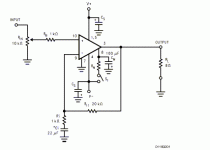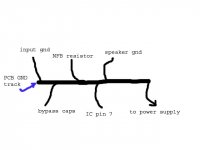hi guys,
I am new in this: hope u guys can help. recently Ive built an amp using the LM3886 IC. I followed the exact schematics from the application datasheet. When the amp is first turned on, it sounds really sweet, untill something like 5 minutes. then it started to distorts heavilly, and the volume decreases. After shutting it down and turning it on again, it sounds ok, and the whole distortion process starts again....-(
I suspected thermal problems, but Ive changed the heatsink to a super duper large one, Ive even installed a fan to cool it. still the problem stays. can anyone help me with this? thanks
__________________
ya da da
I am new in this: hope u guys can help. recently Ive built an amp using the LM3886 IC. I followed the exact schematics from the application datasheet. When the amp is first turned on, it sounds really sweet, untill something like 5 minutes. then it started to distorts heavilly, and the volume decreases. After shutting it down and turning it on again, it sounds ok, and the whole distortion process starts again....-(
I suspected thermal problems, but Ive changed the heatsink to a super duper large one, Ive even installed a fan to cool it. still the problem stays. can anyone help me with this? thanks
__________________
ya da da
skyraider said:hi guys,
I am new in this: hope u guys can help. recently Ive built an amp using the LM3886 IC. I followed the exact schematics from the application datasheet. When the amp is first turned on, it sounds really sweet, untill something like 5 minutes. then it started to distorts heavilly, and the volume decreases. After shutting it down and turning it on again, it sounds ok, and the whole distortion process starts again....-(
I suspected thermal problems, but Ive changed the heatsink to a super duper large one, Ive even installed a fan to cool it. still the problem stays. can anyone help me with this? thanks
__________________
ya da da
Show us the EXACT schematic please.
Probably this amp is oscilating - show us his connection and mainly ( if you have it ) your PCB .
Could we also see some pictures of the amp also so we can make sure the "super duper large" heatsink is really "super duper large" enough 😀 . I had what I thought was a big enough heatsink, but when it would generate a popping sound and distortion after a few minutes of use, I assumed that the heatsink wasn't big enough.
Chips really do need a lot of heatsinking. That same heatsink I originally used overheated the chip so much that the amp would actually shut itself down.
Also, a picture of the pcb traces, or the design from your PC (if you have one) could help us figure out your problem.
Also, did you check for poor solder connections?
-Mike
Chips really do need a lot of heatsinking. That same heatsink I originally used overheated the chip so much that the amp would actually shut itself down.
Also, a picture of the pcb traces, or the design from your PC (if you have one) could help us figure out your problem.
Also, did you check for poor solder connections?
-Mike
sounds like the first one i made. The power rails were to high and the thing oscillated in and out of thermo overload. Discovered this problem by burning myself on the chip. 

The above ideas could well be correct but I have found the Lm3886 to be very cool running. If it's not oscillating (check with 'scope) check that you have the transformers centre tap correctly connected to ground, I seem to recall another thread where someone had left it unconnected (!?) and had exactly the symptoms you are describing.
Jez.
Jez.
I am using aluminium sink, the size about 3inx5inx1in with fins for each chip.
today Ive tried using different spare transformer, checked the earth wiring, and different speakers, but the symptoms still remains: sweet music for 5 minutes, then distortion bulid-up, gets serious untill no music at all and a loud humm.... turning it off and on instantly, and the amp gets ok again,...
sorry i dont have any digicams, i think i might have problems with my circuit. can anyone who have build one let me see the circuit he/she uses? i might need to compare. I am using pcb, and I connected all the necessaru pins from the chip to the board with wires. anything wrong with that?
thanks guys
today Ive tried using different spare transformer, checked the earth wiring, and different speakers, but the symptoms still remains: sweet music for 5 minutes, then distortion bulid-up, gets serious untill no music at all and a loud humm.... turning it off and on instantly, and the amp gets ok again,...
sorry i dont have any digicams, i think i might have problems with my circuit. can anyone who have build one let me see the circuit he/she uses? i might need to compare. I am using pcb, and I connected all the necessaru pins from the chip to the board with wires. anything wrong with that?
thanks guys
skyraider said:I am using pcb, and I connected all the necessaru pins from the chip to the board with wires. anything wrong with that?
thanks guys



 😱
😱 
Yes, there is.

The PSU bypass caps are far from the chip's PSU pins.
Anyway, a picture would help.
And what transformer are you using?
Voltage, VA rating?
wow....
doesn't that seem low 36va?
I was told that the 3875 needs a decent 160 va at a minimum, if i remember well...
it works with less ( i have tried it with 50va but when there is a lot of dynamic (classical music) I could hear the weakness of the trafo's
Jean-Pierre
don't take my word for it though, I am an economist in love with the smell of melting solder!
doesn't that seem low 36va?
I was told that the 3875 needs a decent 160 va at a minimum, if i remember well...
it works with less ( i have tried it with 50va but when there is a lot of dynamic (classical music) I could hear the weakness of the trafo's
Jean-Pierre
don't take my word for it though, I am an economist in love with the smell of melting solder!
which circuit - which voltages ?
Skyraider,
Which schematics do you mean ?
Is this the datasheet you are talking about:
http://cache.national.com/ds/LM/LM3886.pdf ?
Do you mean the SINGLE supply circuit on page 6 ? I don't see any other.
I am just asking because you mention a transformer with three taps.
You wouldn't have by chance connected both (+ and -) voltage supplies to this circuit ?
Gerry
Skyraider,
I followed the exact schematics from the application datasheet.
Which schematics do you mean ?
Is this the datasheet you are talking about:
http://cache.national.com/ds/LM/LM3886.pdf ?
Do you mean the SINGLE supply circuit on page 6 ? I don't see any other.
I am just asking because you mention a transformer with three taps.
You wouldn't have by chance connected both (+ and -) voltage supplies to this circuit ?
Gerry
skyraider said:I am using +/- 18volts, centre tapped, 2 amp transformer. That means 36VA right?
+18v/-18v ct does not mean 36 va
the VA rating is the voltage X the amperage of the transformer😉
sorry, I didnt use the circuit from the LM3886 datasheet, I used this:
I put all the external components on a veroboard, and soldered everything close together so it is almost p2p. Then I connect it to the chip using wires. I think my problem might be oscillations due to ground loop, as i read the forum further, the veroboard has very small traces (too small for 7 amperes). I used a single ground line and the speaker, input, gain resistor seems to be pluged into the single line. DONT USE THIS METHOD.
I think I am going to use true P2P wiring, and keeping every signal lines ASAP(as short as possible). should be able to finish today. Will post it in the forum if im done.
I put all the external components on a veroboard, and soldered everything close together so it is almost p2p. Then I connect it to the chip using wires. I think my problem might be oscillations due to ground loop, as i read the forum further, the veroboard has very small traces (too small for 7 amperes). I used a single ground line and the speaker, input, gain resistor seems to be pluged into the single line. DONT USE THIS METHOD.
I think I am going to use true P2P wiring, and keeping every signal lines ASAP(as short as possible). should be able to finish today. Will post it in the forum if im done.
Attachments
thanks for the tips guys, Ive finally solved my problems.
The improper ground lines thats causing oscillations. Previously, my old circuit looks like this:
Previously, I wired all the external components to a stripboard, and I connect the chip to the board using wires(about 3 inches long). Ground loops happens because it seems that all the components are plugged into a single earth line, and to make it worse, the line is a very small PCB track.
This morning I took everything apart, I used P2P wiring, and connected all the earth wiring to a star, making it like an ideal sink. I kept all the wires short, and bypass caps as close to the chip as possible LM3886 has been abusing my neighbours for two hours now.
I get lower noise floor than before, and I think I am hearing extra noises from my carbon resistors. from here I understand 2 things:
1) how to identify an amp oscilating.
2) all ground line is best connected to a centre point, making a star shape. For this, P2P wiring is and advantage.
Thanks for helping out, guys. Now Im looking into making a good casing.
The improper ground lines thats causing oscillations. Previously, my old circuit looks like this:
Previously, I wired all the external components to a stripboard, and I connect the chip to the board using wires(about 3 inches long). Ground loops happens because it seems that all the components are plugged into a single earth line, and to make it worse, the line is a very small PCB track.
This morning I took everything apart, I used P2P wiring, and connected all the earth wiring to a star, making it like an ideal sink. I kept all the wires short, and bypass caps as close to the chip as possible LM3886 has been abusing my neighbours for two hours now.
I get lower noise floor than before, and I think I am hearing extra noises from my carbon resistors. from here I understand 2 things:
1) how to identify an amp oscilating.
2) all ground line is best connected to a centre point, making a star shape. For this, P2P wiring is and advantage.
Thanks for helping out, guys. Now Im looking into making a good casing.
Attachments
skyraider said:I am using +/- 18volts, centre tapped, 2 amp transformer. That means 36VA right?
That's 72 VA.
And it's low for a single LM3886, let alone a pair of them.😱
If you crank up the volume you may end with a burned transformer.

And don't use 4 ohms speakers.


Bypass cap should be connected as close as possible to the LM3886. This is valid for all electronics.
- Status
- Not open for further replies.
- Home
- Amplifiers
- Chip Amps
- LM3886 problem

